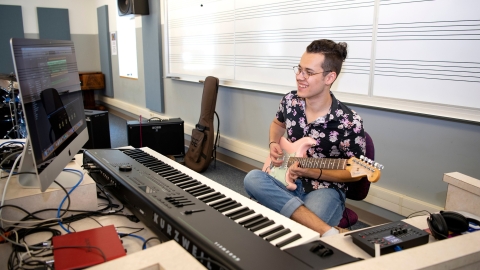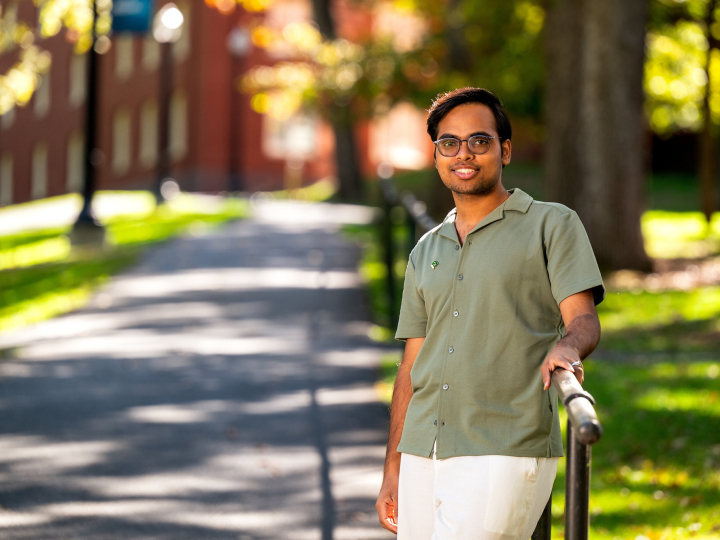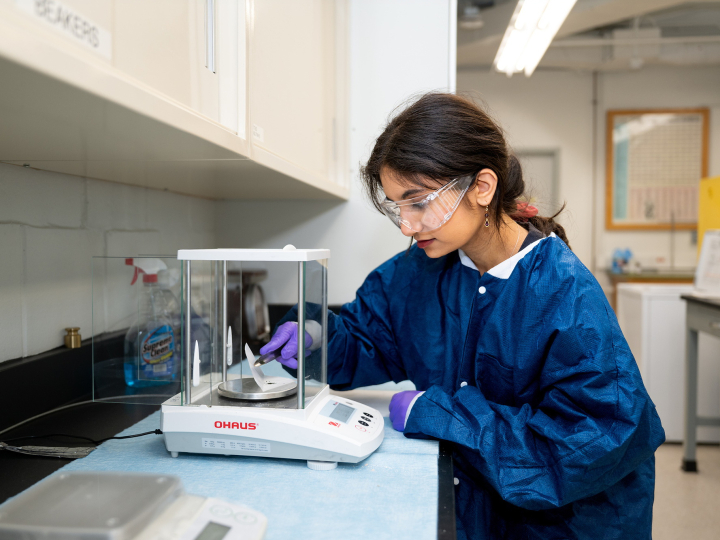
Ian Herdt ’22, Computer Science
September 24, 2021
Ian Herdt '22 is designing software that will use artificial intelligence to write snippets of music, potentially helping songwriters overcome writer's block. Photo by Emily Paine, Communications
In high school, Ian Herdt '22 was a gamer — fond of titles like Pokémon, Borderlands 2 and Destiny.
But the native of Mount Airy, Md., was just as intrigued by what was happening inside his game consoles and blinking PC tower. So he joined his school's student IT group with a bunch of other tech-savvy friends.
Despite his growing interest in computers, Herdt never learned serious coding. That made him wonder whether he'd be at a disadvantage as a computer science major "without a lick of understanding what a 'for-loop' is or what an 'if statement' is," he says.
During his first year at Bucknell, in a class with Professor Susan Baish, computer science, Herdt learned those concerns were unfounded.
"That class was designed perfectly both for people who have ample computer science coding experience and those who don't even know the most basic concepts," Herdt says. "They do such a good job."
Through classes like this, Herdt began to see that computer science is woven into every single field — every business, every organization, every aspect of modern life. That's true even in music, another of Herdt's interests.
"Music is my greatest passion in life. It's what I wake up and look forward to doing," he says. "But I feared it'd be highly implausible to pursue a career in music. It takes a ridiculous amount of skill and luck to be able to make it as a live performer, and I was nowhere near the point of technical proficiency on my instrument."
So he chose the high-paying field of computer science, assuming he'd continue music as a primary hobby.
"And then I realized, you can absolutely pursue the intersection of the two because there's so much innovation that can be created there," Herdt says.
While musicians have been experimenting with computers for decades, the intersection of the two is still mostly unexplored. Herdt wants to work for a music software company, helping design the digital tools that amateur and professional musicians will use to make the next great song.
Through it all, Herdt knows a career in computer science will have its ups and downs. He imagines Sisyphus endlessly pushing that boulder up the hill.
"You'll run into bug after bug, error after error, and the boulder will just keep rolling back down," Herdt says. "But you'll refuse to give up, and then all of a sudden you get over that hill and it's such a wave of relief and excitement."
The celebration is temporary, Herdt says, because in computer science, there are always fresh challenges to conquer.
"Once you get to that peak, you realize, 'Oh there's another hill that's three times the height,' " he says. "And so you immediately go back to pushing that boulder and struggling through the blood, sweat and tears — metaphorically, of course, because you're just typing on a keyboard."
Making Computers Make Music
At Bucknell, students aren't forced to follow the same trodden path toward their degree. They can choose courses outside their major to uncover the fascinating interplay between different fields.
For Herdt, this has meant plenty of time inside the Weis Music Building with Professor Paul Botelho. Herdt and Botelho have been researching an emerging songwriting technique called algorithmic composition.
"Essentially, you write a piece of code that is able to make decisions," Herdt says. "Then you feed it different parameters — I want this time signature or this key — and the computer, based on a bunch of decisions it makes on its own, will spit out a chord progression or rhythm."
While we won't see an AI-written album on the Billboard 200 chart any time soon, Herdt says the technology could be used to cure writer's block by suggesting a small bit of melody that could spark a song.
"Everybody's been at that point where you've been putting off writing a paper, and you open Google Docs and it's just a blank page," Herdt says. "What if you had a little button that you could press to give you a basic idea to get you started?"
More Than a Name in a Computer
Herdt went to a private school where all 500 students — kindergarten through 12th grade — were under the same roof. His graduating class was just 26 students; he'd known half of them since kindergarten.
Based on that positive experience, Herdt knew he wanted to attend a small university where he'd be more than a number.
"I wanted to have a personal connection with my professors," he says. "And to know a lot of the faces of people I'd walk by — instead of seeing a person and then never seeing them again my entire four years."
During his first year at Bucknell, Herdt met Professor Luiz Felipe Perrone, who chairs the computer science department. For Herdt, his interactions with Perrone validated his decision to choose Bucknell.
After three-plus years of collaborative experiences in the computer science department, Herdt now sees Perrone as a genuine friend — someone he can talk to about whatever's on his mind.
"There's nothing that could have prepared me for having someone that reliable, helpful, caring and just genuine as a professor," Herdt says. "He didn't see it as something that, as a professor, he needed to do. He wants to spend time with students because he cares about them."
That selflessness can be contagious.
At a recent gathering of student researchers representing all three Bucknell colleges, Herdt eagerly listened as his fellow students shared updates about their work. On several occasions, Herdt raised his hand and offered to help them use computer science to enhance, simplify or otherwise improve their efforts.
"I don't understand people who go day to day just focused on themselves," he says. "Generosity should be an inherently human thing. Part of what makes life so wonderful is being able to help other people. I like the idea of having people have their days brightened a little bit."

